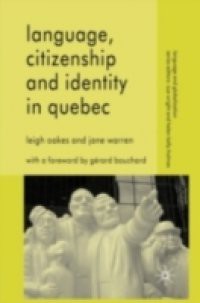The social, political, and economic conditions that accompany globalisation are calling for new conceptualisations of belonging within culturally diverse communities. In Language, Citizenship and Identity in Quebec, the authors take Quebec as a particularly intriguing case study of one such community. They examine how Quebec seeks to foster a sense of belonging among the minorities within its borders through the promotion of a common citizenship, with French as the key element. As a nation without a state, Quebec is driven by two distinct imperatives: the need to affirm a robust Francophone identity within the Anglophone sphere of North America, and the civic obligation to accommodate an increasingly diverse range of migrant groups as well as demands for recognition by Aboriginal and Anglophone minorities. This is the first comprehensive study in English to make a sociolinguistic contribution to the question of Quebec identity, as Quebec defines itself in a globalising world and as it engages with the diversity within its borders.

